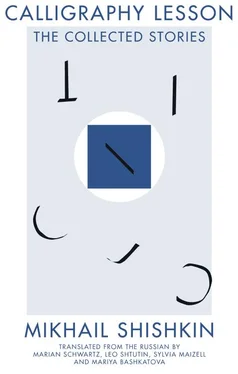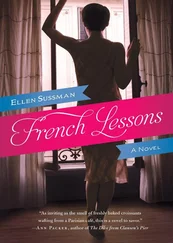Mikhail Shishkin - Calligraphy Lesson
Здесь есть возможность читать онлайн «Mikhail Shishkin - Calligraphy Lesson» весь текст электронной книги совершенно бесплатно (целиком полную версию без сокращений). В некоторых случаях можно слушать аудио, скачать через торрент в формате fb2 и присутствует краткое содержание. Город: Dallas, Год выпуска: 2015, ISBN: 2015, Издательство: Deep Vellum Publishing, Жанр: Современная проза, на английском языке. Описание произведения, (предисловие) а так же отзывы посетителей доступны на портале библиотеки ЛибКат.
- Название:Calligraphy Lesson
- Автор:
- Издательство:Deep Vellum Publishing
- Жанр:
- Год:2015
- Город:Dallas
- ISBN:978-1-941920-02-2
- Рейтинг книги:4 / 5. Голосов: 1
-
Избранное:Добавить в избранное
- Отзывы:
-
Ваша оценка:
- 80
- 1
- 2
- 3
- 4
- 5
Calligraphy Lesson: краткое содержание, описание и аннотация
Предлагаем к чтению аннотацию, описание, краткое содержание или предисловие (зависит от того, что написал сам автор книги «Calligraphy Lesson»). Если вы не нашли необходимую информацию о книге — напишите в комментариях, мы постараемся отыскать её.
Calligraphy Lesson — читать онлайн бесплатно полную книгу (весь текст) целиком
Ниже представлен текст книги, разбитый по страницам. Система сохранения места последней прочитанной страницы, позволяет с удобством читать онлайн бесплатно книгу «Calligraphy Lesson», без необходимости каждый раз заново искать на чём Вы остановились. Поставьте закладку, и сможете в любой момент перейти на страницу, на которой закончили чтение.
Интервал:
Закладка:
In the winter she was transferred to Pinega, where she contracted typhus. Fritz rushed off to her in this remote exile. He traveled through Moscow and Petersburg to Arkhangelsk, and from there six more days by sled.
And again, as so often before, their time together brought no joy. When he left she wrote, “Why do we love each other more when we’re apart? Tell me!”
We know from Fritz’ diary that for him this visit was a turning point in his relationship to his wife.
On route to Moscow he makes this entry: “I no longer have any illusions. We do not have and cannot have any real closeness—letters are one thing—but life’s something completely different. We’re close only with thousands of kilometers between us. Probably Lydia’s a certain kind of woman—a woman wired for self destruction and not the continuation of life. All her life she’s been destroying herself and dragging down everyone around her. Once she and I read Russian novels about superfluous people. She’s one of them. I can’t bear it. I’m a part of life and life’s a part of me. I must give her up. I’ve never felt such bitterness and such pain.”
Then and there he sent a letter from Moscow telling her he wanted to break off the relationship. “Lydia, I’m beside myself. I have to let you go and follow my own path. I’m healthy, not old yet. I want a nest, comfort, a family. At night I want to come home. We’ll never have this together. We have to let each other go.”
Fritz asked for a divorce. She agreed but kept writing to him because these letters were the last thing left to her. This blow coincided with another blow of fate from which she was unable to recover.
It came out in Pinega that Burstev, whom Lydia had greatly admired, circulated a letter abroad accusing her of being a provocateur and working for the tsarist secret police.
“I can only think of how vile people are,” she tells Fritz in despair. “I would have born everything from my enemies. But to be knocked down by my own kind? I thought I had found a family among my comrades, but instead I found treachery and slander. My whole life is destroyed, everything I held sacred—sullied and debased. As if my very soul were trampled and smeared. I can’t go on. I don’t want to. I’ve nothing left to believe in. I do not want to and cannot go on.”
Lydia begged her former husband to contact Burtsev in Paris and clear up this monstrous misunderstanding. Fritz wrote to him, but it’s not known if Burstev ever answered.
She felt cornered. “People shun me like a leper. All the exiles turn away from me. Around me there’s only contempt and hatred. How can one live when everyone hates you? But maybe this hatred is a punishment for the hatred I felt for my enemies. So now I’m for my comrades the enemy. What should I do? Should I forgive everyone everything? No, I can’t do that. Anyhow, I have no strength left for forgiveness or hate. Should I hang myself? But that won’t prove my innocence.”
She resolved to break for good with the Socialist Revolutionary Party, which had been her faith and truth.
After exile there was no place for her to go. She had no home. No one was waiting for her anywhere. In 1911 she arrived in Moscow from Pinega and stayed at her estranged brother Vyacheslav’s, with whom she had once broken all ties. Her mother was living there too.
Lydia continued sending anguished letters to Zurich.
With each letter she seemed to be closing the door on her life.
“Life passes and I still don’t know why I came into this world. I gave nothing to anyone. I’m worthless. I lost faith in myself. I don’t belong among people. Not even the closest ones. I start the day trading curses with my mother. And my brother. And his wife. With my mother it hurts the most. There’s no bridge between us, not even the tiniest sliver. Loneliness. Old age. I’m 40, but I look 60. She’s 60 and looks every bit 80. How awful when it suddenly hits you that at least she has me and Vyacheslav, distant and alien, but still her own children. But what and whom do I have? No one. And there’ll be no one any more. My one wish is to crawl away as far as possible from people and quietly croak.”
In another letter, sent in the fall of 1913, she tried to make sense of her past, to sort out important moments in her life, and again reminded him of Venice. “My love, I cannot describe to you the state I’m in. I’m the most wretched person on earth. I never thought that one could be that wretched. The only thing I had was you, our love, that gift which I received and spurned. Then, in Venice it was all still possible. I committed an error. Everything I chose over life with my beloved turned out a lie. Everything is a lie. Lofty ideas are a lie. The revolution is a lie. The people are a lie. All the beautiful words are a lie, a lie, a lie. Yet I blame no one. Only I am responsible for my wasted life. Then, in Venice, it was still possible to change everything. Or was it already impossible? I don’t know. I don’t know anything more. I no longer exist. The sooner I die, the better. My body still drags around from inertia, but the soul’s gone. It’s long dead. Do you know what my ideal is now? To disappear quietly, unnoticed, so that I leave nothing, not even my corpse.”
She continued writing to him for some time, but he rarely answered. Most likely these letters are all that is left of her.
Their correspondence broke off during the First World War.
Nothing is known of Lydia Petrovna Kochetkova’s death.
This is from the last available letter.
“My darling! Do you know what I regret most of all? I could have given you all the fullness of my love, but I gave you nothing but pain. Forgive me, if you can. And my heart cries out at the thought that my highest calling was just that—to give you my affection and tenderness, but instead I squandered my worthless life on phantoms.”
Translated by Sylvia MaizellIn a Boat Scratched on a Wall
Language, as it creates reality, judges: it punishes and pardons. Language is its own verdict. There is nowhere to appeal. All higher courts are nonverbal. Even before writing anything, the writer, like Laocoön, has been pinioned by the language snake. If he is to explain anything, the writer must be freed from language.
It took quite a while after my move from Pushka to the canton of Zurich for the bizarre sensation of irreality, the carnival quality of what was happening to me, to be replaced, little by little, by the tentative and amazed confidence that, indeed, there was no deception here. The trains were not toy trains, the landscape not painted, the people not planted there.
Immediately following the change of scenery, I tried to finish writing the novel I’d begun in Moscow, but I got nowhere. The letters I’d traced out there had a totally different density here. The novel ended up being about something else. Every word is a high step you trip over.
Borders, distance, and air do wonders for words. A combination of Russian sounds that was so obvious and natural on Malaya Dmitrovka, with the Chekhov Casino raging outside, can’t get through customs here. Words stripped of any independent existence there seem to take up residency here and become not a means but a subject of verbal law. Here, any Russian word sounds all wrong and means something completely different. There, in the theater, the meaning of any spoken phrase changes with the sets.
On the banks of the Limmat, it’s as if there’s a different center of gravity, and any word out of a Russian inkwell weighs much more than in Russian’s country of origin. What in Russia suffuses, litters the atmosphere, the sediments and snouts, Grushnitsky the cadet, the war in Chechnya, and “Christ has risen from the dead,” here is all concentrated in every word written in Cyrillic—crammed, rammed into every last ы.
Читать дальшеИнтервал:
Закладка:
Похожие книги на «Calligraphy Lesson»
Представляем Вашему вниманию похожие книги на «Calligraphy Lesson» списком для выбора. Мы отобрали схожую по названию и смыслу литературу в надежде предоставить читателям больше вариантов отыскать новые, интересные, ещё непрочитанные произведения.
Обсуждение, отзывы о книге «Calligraphy Lesson» и просто собственные мнения читателей. Оставьте ваши комментарии, напишите, что Вы думаете о произведении, его смысле или главных героях. Укажите что конкретно понравилось, а что нет, и почему Вы так считаете.












